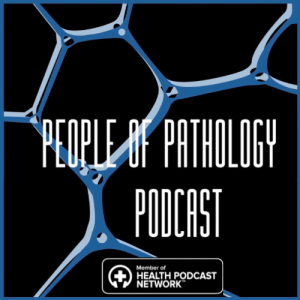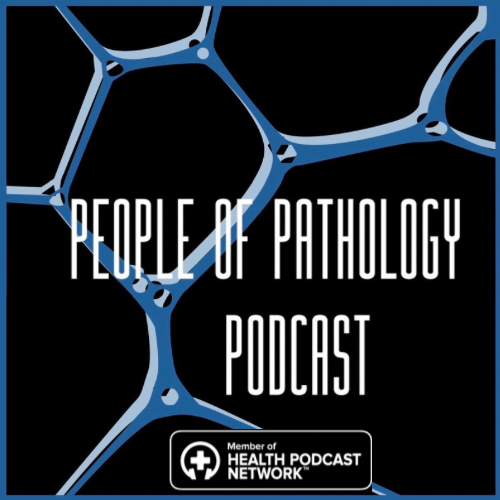Episodes

7 days ago
7 days ago
Today my guest is Forensic Pathologist Dr Nicole R Jackson.
What we discuss with Dr Jackson:
- Her term as President of the Society of Black Pathology
- Consulting with the SUDC Foundation
- Her current role at the University of Washington
- EPAs in autopsy training
- The recent publication Health disparities among incarcerated populations: a crucial laboratory and pathology review.
- The impact of social media in pathology and forensic pathology
Links for this episode:
Pathologists' Assistant Shadowing Network
Health disparities among incarcerated populations: a crucial laboratory and pathology review
Challenges in autopsy training for pathology residents: A survey of autopsy directors
People of Pathology Podcast:

Monday Jun 30, 2025
Monday Jun 30, 2025
Today my guests are Peter O'Toole and Colin Murphy from mTuitive.
What we discuss with Colin and Peter:
- Colin's and Peter’s journeys to mTuitive
- The origin story of mTuitive
- Challenges and adoption of structured data
- Collaborations with CAP and ACS
- The future of digital pathology and structured data
- Real-time reference materials feature in mTuitive
- Customer success stories and favorite features
- Integration with major EHR systems
- Future innovations and improvements
Links for this episode:
Pathologists' Assistant Shadowing Network
College of American Pathologists Cancer Protocol Templates
People of Pathology Podcast:

Monday Jun 23, 2025
Monday Jun 23, 2025
My guest today is Dr Kene Ojukwu.
What we discuss with Dr Ojukwu:
- How she discovered pathology
- Educational pursuits: from public health to public policy
- Community engagement: Knowledge is Power Project
- Health literacy and dermatopathology education
- Challenges and innovations in patient-facing pathology
- Exploring language in medical diagnosis
- Inclusive pathology education
- Understanding learning styles in medical education
- Empowering self-assessment in medical training
- The human impact of pathology
- Policy influence in medical training
- The future of pathology and health equity
Links for this episode:
Pathologists' Assistant Shadowing Network
UCLA National Clinician Scholars Program
Pathology Project Wins Back to Bedside Recognition
People of Pathology Podcast:

Monday Jun 16, 2025
Monday Jun 16, 2025
Today my guest is artist Evin Felix.
What we discuss with Evin:
- Her introduction to art through her father
- Discovering a passion for painting
- The pathology art series: A healing journey
- Her artistic process as emotional expression
- How her work became part of The Healing Art of Pathology book
- The impact of her art on others
Links for this episode:
Pathologists' Assistant Shadowing Network
People of Pathology Podcast:

Monday Jun 09, 2025
Monday Jun 09, 2025
Today my guests are Dr Meriem Sefta, Chief Diagnostics Officer at Owkin, and Amanda Coble, Senior Director of Product at Proscia.
What we discuss with Amanda and Dr Sefta:
- The history of Owkin
- Founding vision and early challenges
- Deep learning in pathology
- Mission and Precision Oncology
- Digital pathology and AI integration
- Biomarker screening products like MSIntuit CRC
- Outcome prediction solutions like RlapsRisk BC
- Partnership with Proscia
- The future of pathology with AI
- Interoperability and collaboration
Disclaimer:
MSIntuit CRC, BRCAura BC, and RlapsRisk BC are under development and not for clinical use. They are not FDA cleared or approved in the USA. BRCAura BC and RlapsRisk BC are developed within the PortrAIt consortium, a french consortium financed by the government within the framework of France 2030 and by the European Union - Next Generation EU within the framework of the France Relance Plan.
Owkin interoperability with Proscia's software is for Research Use Only. Not for use in diagnostic procedures.
Links for this episode:
Pathologists' Assistant Shadowing Network
Owkin And Proscia Expand Access To AI Pre-Screening For Colorectal Cancer Patients
People of Pathology Podcast:

Monday May 05, 2025
Monday May 05, 2025
My guest today is Dr Soufiane Azdad, founder of Algoscope.
What we discuss with Dr Azdad:
- His journey into pathology
- Early experiences and challenges in pathology
- The Turning Point: Misplaced specimen incident
- Inspiration from technology and entrepreneurship
- Founding AlgoScope: The Mission and Vision
- The future of Digital Pathology
- Innovations in the grossing process
- The role of AI and robotics in pathology
- Utilizing innovation in pathology education and training
- Envisioning the future of pathology
- Ethical considerations in pathology
Links for this episode:
Pathologists' Assistant Shadowing Network
From Grossing to Diagnosis: Why pre-analytics deserves a digital revolution
People of Pathology Podcast:

Monday Apr 21, 2025
Monday Apr 21, 2025
My guest today is Dr Swikrity Baskota.
What we discuss with Dr Baskota:
- How Dr Baskota uses social media to promote pathology
- Attracting more students to pathology
- Founding and expanding Match to Path
- The importance of mentorship
- Challenges for pathology applicants and how Match To Path can help
- Free resources on Match to Path
- Dr Baskota's personal journey into pathology
- Advancements in cytopathology and AI
- Advice for aspiring pathologists
Links for this episode:
Pathologists' Assistant Shadowing Network
Match To Path:
Dr Swikrity Baskota:
People of Pathology Podcast:

Monday Apr 14, 2025
Monday Apr 14, 2025
Today is #PathAssistDay 2025, and my guest is Pathologists' Assistant Marissa Spencer.
What we discuss with Marissa:
- The evolution of PA education and training
- Personalized teaching approaches
- The rewarding role of a preceptor
- The growth and expansion of PA programs across the country
- PAs in Forensic Pathology
- The PA's role in teaching residents
- The Role of PAs in tissue banking
- Future Directions: technology in pathology
- Advocating for the PA profession
- Advice for aspiring PAs and the importance of shadowing
Links for this episode:
Pathologists' Assistant Shadowing Network
American Association of Pathologists' Assistants
People of Pathology Podcast:

Monday Mar 31, 2025
Monday Mar 31, 2025
My guest today is Ashley Kalinauskas, CEO of Torigen Pharmaceuticals.
What we discuss with Ashley:
- How her graduate research at Notre Dame led to the founding of Torigen Pharmaceuticals.
- Their approach provides an alternative to chemotherapy by using immunotherapy.
- The company aims to make cancer treatment more accessible and affordable for pet owners.
- Promising results have been seen in aggressive cancers like hemangiosarcoma.
- How Torigen is utilizing digital pathology with the Concentriq platform to improve cancer diagnostics.
- Torigen is conducting research into additional applications, including equine and exotic animal cancers.
- Studying spontaneous cancer in pets provides valuable insights for human oncology research.
- Veterinary immunotherapy advancements have the potential to influence human cancer treatments.
- Immunotherapy is playing an increasingly important role in both veterinary and human medicine.
Links for this episode:
Pathologists' Assistant Shadowing Network
People of Pathology Podcast:

Monday Mar 17, 2025
Monday Mar 17, 2025
Today my guest is Dr Meredith Herman.
What we discuss with Dr Herman:
- The recently published paper titled "#Path Art: From Glass Slide to Canvas with a Mission of Enlightening the Burdens of Life."
- The inspiration for the paper came from the use of the hashtag #PathArt on social media, where pathologists share artistic representations of histology and pathology.
- The research involved exploring the historical use of art in pathology, dating back to the 1600s, and its role in education before modern technology.
- Pathology is inherently visual, making art a natural fit for the field; many pathologists have creative hobbies.
- The rise of Path Twitter (now Path X) has positively influenced the pathology community, fostering a movement around pathology art.
- Path art competitions have emerged, promoting interest in pathology among students and the public.
- Ethical considerations in path art include maintaining patient anonymity and being sensitive to the serious nature of diseases depicted.
- The importance of intent in sharing art, aiming for education and appreciation rather than trivialization.
- White Coat Artistry, which Dr Herman started during medical school, and has grown through social media engagement.
- Dr Herman's journey into pathology beginning with an interest in biomedical laboratory science and was solidified by mentorship from a pathologist.
Links for this episode:
Pathologists' Assistant Shadowing Network
#PathArt: from glass slide to canvas; with a mission of enlightening the burdens of life
Dr Herman on Instagram
People of Pathology Podcast:

